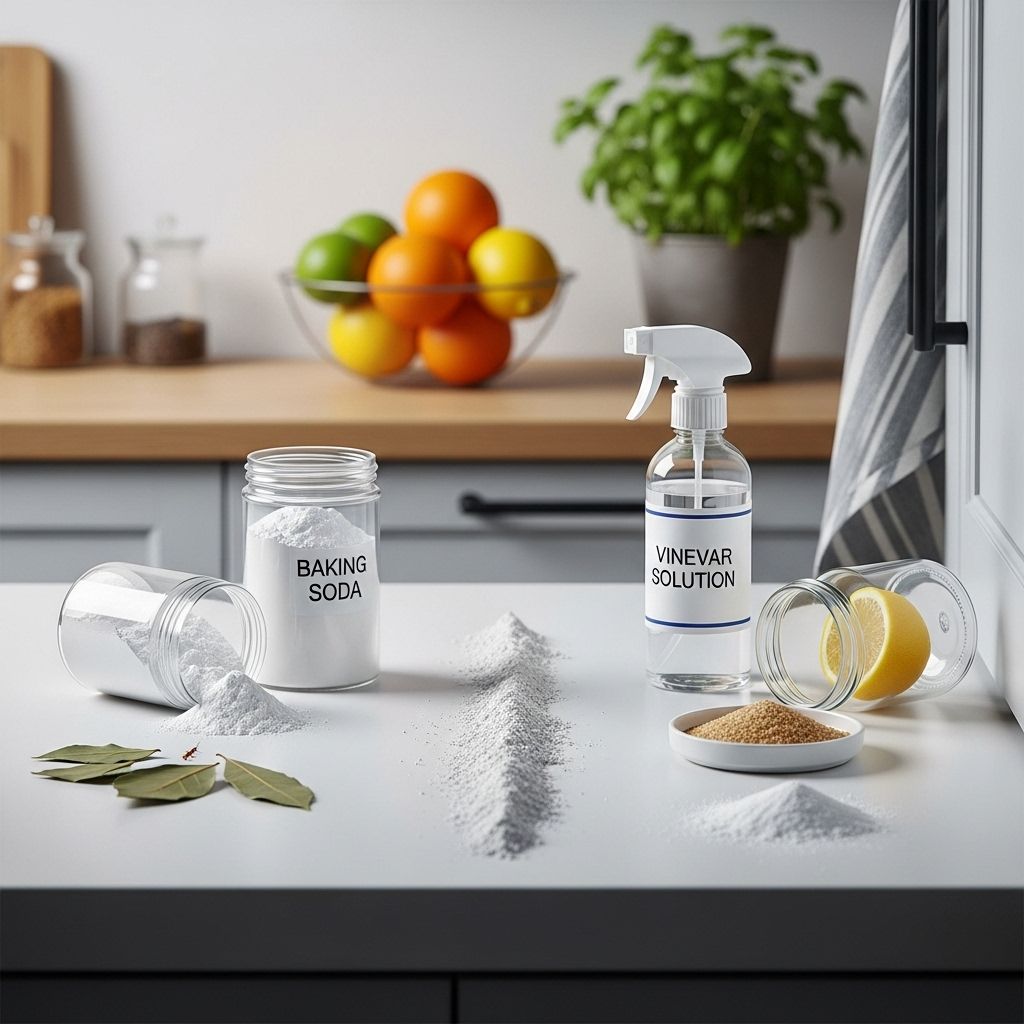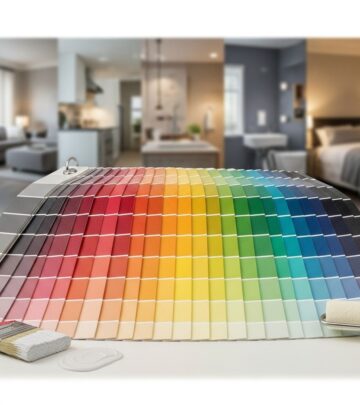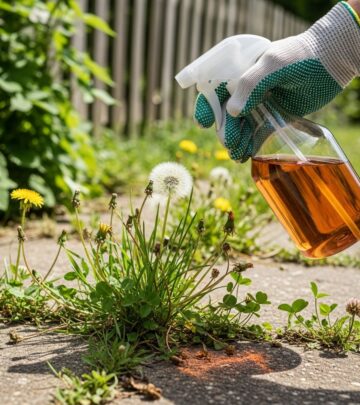How to Get Rid of Cockroaches Naturally: 7 Effective Solutions
Discover effective, chemical-free methods to banish cockroaches and keep your home pest-free naturally

Image: HearthJunction Design Team
7 Natural Ways to Eliminate Cockroaches From Your Home
Few household pests trigger as much disgust as cockroaches. These resilient insects not only spread bacteria and contaminate food but can also trigger allergies and asthma in sensitive individuals. While commercial pesticides are readily available, many homeowners prefer natural solutions that are safer for families, pets, and the environment. The good news is that effective cockroach control doesn’t necessarily require harsh chemicals—nature provides numerous ways to combat these persistent pests.
Before diving into natural remedies, it’s important to understand what attracts cockroaches to your home in the first place. These opportunistic insects are drawn to food sources, moisture, and shelter. By addressing these conducive conditions, you can make significant progress in your cockroach control efforts.
Why Choose Natural Cockroach Control Methods?
Natural remedies offer several advantages over chemical pesticides. They’re generally safer for households with children and pets, pose fewer health risks to residents, and have less environmental impact. Additionally, some cockroach species have developed resistance to common pesticides, making natural alternatives worth considering.
Starting with all-natural solutions is wise, but it requires diligence and attention to detail. Natural cockroach control focuses on eliminating the conditions that attract and sustain these pests rather than simply killing them with chemicals. Let’s explore seven effective natural methods to get rid of roaches and prevent future infestations.
1. Perform a Deep Cleaning
The foundation of successful cockroach control starts with a clean living space. Dirty conditions provide cockroaches with food sources, while clutter creates perfect hiding spots for these nocturnal pests.
When tackling a deep clean, wear clothes that can get dirty and have a dust mask and high-quality flashlight handy. Focus your cleaning efforts on high-risk areas:
- Kitchens: Clean under and behind appliances, inside cabinets, and along baseboards where food particles accumulate.
- Bathrooms: Address drain scum, moisture from sinks, and hiding places under vanities.
- Garbage areas: Ensure trash cans have tight-fitting lids and are cleaned regularly to prevent attracting roaches.
Pay special attention to fixing any leaky pipes or faucets, as moisture is a primary attractant for cockroaches. Wipe down counters after meal preparation and promptly clean dishes rather than leaving them in the sink overnight. Store food in airtight containers and avoid leaving pet food out, especially overnight when cockroaches are most active.
2. Vacuum Regularly
Vacuuming is a surprisingly effective tool in cockroach control, particularly for combating German cockroaches—the most common indoor species. Regular vacuuming removes food particles that attract roaches and eliminates cockroach droppings, which can cause health problems like asthma.
What makes vacuuming especially powerful against German cockroaches is its impact on their reproduction cycle. Unlike other species that deposit egg cases, German cockroach females carry their eggs on their backs. By vacuuming up adult roaches, you’re simultaneously removing potential future generations.
Use vacuum attachments to reach deep into cracks, crevices, and hard-to-reach areas where cockroaches hide. Focus on areas behind appliances, along baseboards, and inside cabinets. After vacuuming, promptly empty the container or bag outside your home to prevent captured roaches from escaping back into your living space.
3. Try Essential Oils
Several essential oils have proven effective as natural cockroach repellents due to their strong scents that roaches find offensive. These oils can be used to create DIY sprays that deter cockroaches from entering treated areas.
Lemon Oil Spray
One of the quickest and easiest options is to mix lemon juice with water in a spray bottle. This citrus solution can be sprayed around entry points, along baseboards, and in cockroach-prone areas. The acidic nature and strong scent of lemon repel cockroaches effectively.
Mint Oil Spray
Mint oil has a strong, refreshing aroma that cockroaches find unpleasant. Create a mint oil spray by adding 10-15 drops of peppermint essential oil to a cup of water. Spray this solution around your home to create a natural barrier against roaches. As an added benefit, mint oil has antimicrobial properties that help keep your home clean while providing a fresh scent.
Eucalyptus Oil
Known for its pungent aroma, eucalyptus oil serves as an effective natural repellent against cockroaches and other insects. Mix 10 drops of eucalyptus oil with water in a spray bottle and apply to areas where roaches are likely to enter or hide. Reapply this solution regularly for continued effectiveness.
4. Use Diatomaceous Earth
Diatomaceous Earth (DE) is a natural substance made from the fossilized remains of tiny aquatic organisms. While harmless to humans and pets, DE is deadly to cockroaches and other insects with exoskeletons. It works by cutting through the cockroach’s protective outer layer, causing them to dehydrate and die.
For effective application:
- Use only food-grade diatomaceous earth for indoor use
- Sprinkle a thin layer in areas where cockroaches travel, such as under appliances, along baseboards, and in cabinet corners
- Reapply after cleaning or if the powder becomes wet
- Wear a mask when applying to avoid inhaling the fine dust
DE provides long-lasting protection as long as it remains dry. It’s particularly effective as a preventative measure when applied in potential entry points around your home.
5. Deploy Baking Soda and Sugar
This simple yet effective home remedy exploits cockroaches’ attraction to sweet substances. When cockroaches consume the mixture, the baking soda reacts in their digestive system, producing gas that they cannot expel, ultimately killing them.
To create this natural bait:
- Mix equal parts baking soda and sugar
- Place small amounts of the mixture in shallow dishes or directly in areas where cockroach activity has been observed
- Position the bait near suspected roach entry points and hiding places
This method is particularly useful for targeting large numbers of roaches, as they’ll be attracted to the sugar and unknowingly consume the harmful baking soda. Replace the mixture regularly to maintain its effectiveness.
6. Utilize Neem Oil
Neem oil is a powerful natural insecticide extracted from the seeds of the neem tree. It contains a compound called azadirachtin, which disrupts the hormonal systems of cockroaches, affecting their ability to feed, molt, and reproduce.
To use neem oil as a cockroach control measure:
- Dilute pure neem oil with water according to product instructions
- Add a few drops of dish soap to help the solution mix properly
- Apply the solution to areas where cockroaches travel or hide
- Reapply every few days until the infestation subsides
While neem oil may be slightly more expensive than other home remedies, it’s still more cost-effective than professional extermination services. Its ability to disrupt reproduction makes it particularly valuable for long-term cockroach control.
7. Create Natural Barriers with Bay Leaves
Bay leaves have a strong scent that cockroaches find repulsive, making them an excellent natural deterrent. This simple remedy requires minimal effort and provides ongoing protection in areas where roaches might enter or hide.
To use bay leaves effectively:
- Place whole bay leaves in kitchen cabinets, drawers, and pantries
- Crush dried bay leaves and sprinkle them near suspected entry points
- Replace the leaves every few weeks as the scent diminishes
Bay leaves are particularly useful as a preventative measure in areas where food is stored. Their pleasant aroma is barely noticeable to humans but acts as an effective deterrent to cockroaches seeking food sources.
Prevention: The Key to Long-Term Success
While these natural remedies can help eliminate existing cockroach populations, prevention is crucial for long-term control. Implement these preventative measures to keep cockroaches from returning:
- Seal entry points: Cockroaches can squeeze through incredibly small openings. Use caulk to seal cracks around pipes, windows, doors, and foundations.
- Reduce moisture: Fix leaky pipes and faucets, use dehumidifiers in damp areas, and ensure proper ventilation in bathrooms and kitchens.
- Proper food storage: Store all food in airtight containers, including pet food and pantry items.
- Regular cleaning: Maintain a consistent cleaning schedule, paying special attention to kitchen and bathroom areas.
- Declutter regularly: Minimize hiding places by reducing clutter, especially in storage areas, basements, and garages.
By combining these preventative measures with natural control methods, you can create an environment that’s inhospitable to cockroaches while remaining safe for your family and pets.
When to Seek Professional Help
While natural remedies can be effective for minor to moderate infestations, severe cockroach problems may require professional intervention. Consider contacting a pest control professional if:
- You’ve tried multiple natural methods without success
- The infestation is spreading despite your best efforts
- You’re seeing roaches during daylight hours (often indicating a large population)
- You have concerns about health risks, especially for household members with respiratory conditions
Many pest control companies now offer eco-friendly or integrated pest management options that minimize chemical use while effectively controlling cockroach populations.
Frequently Asked Questions (FAQs)
Q: How long does it take to get rid of cockroaches naturally?
A: Natural methods typically take longer than chemical treatments, often requiring 2-6 weeks of consistent application. Success depends on the severity of the infestation, the species of cockroach, and how thoroughly you implement the techniques.
Q: Can I use vinegar to repel cockroaches?
A: Yes, white vinegar mixed with equal parts water creates an effective cockroach repellent spray. The strong smell deters roaches, and vinegar’s acidic properties help eliminate the pheromone trails they use to navigate.
Q: Are cockroaches dangerous to have in my home?
A: Yes, cockroaches can pose health risks. They spread bacteria, contaminate food, and produce allergens that can trigger asthma attacks and allergic reactions, especially in children and sensitive individuals.
Q: Will keeping my home clean guarantee I won’t get cockroaches?
A: While cleanliness significantly reduces the risk, cockroaches can still enter homes in search of water, especially during dry seasons or extreme weather conditions. Even clean homes may require preventative measures.
Q: How do I know if natural methods are working?
A: Look for signs that the cockroach population is declining: fewer sightings, decreased droppings, and reduced egg cases. You may initially see more roaches as they’re flushed from hiding places, but numbers should decrease within 1-2 weeks if treatments are effective.
By implementing these seven natural cockroach control methods and maintaining vigilant prevention practices, you can effectively manage and eliminate cockroach problems without resorting to harsh chemicals. Remember that persistence is key—natural solutions require consistent application and patience, but the result is a healthier, roach-free home environment.
References
- https://www.thespruce.com/get-rid-of-roaches-naturally-1388145
- https://hicare.in/blog/best-home-remedies-for-cockroach-treatment/
- https://www.ecoguardpestmanagement.com/pest-resources/cockroach-repellent
- https://grove.co/blog/8-tips-to-get-rid-of-roaches-naturally
- https://www.maine.gov/dacf/php/gotpests/bugs/factsheets/cockroaches-fla.pdf
Read full bio of Anjali Sayee










